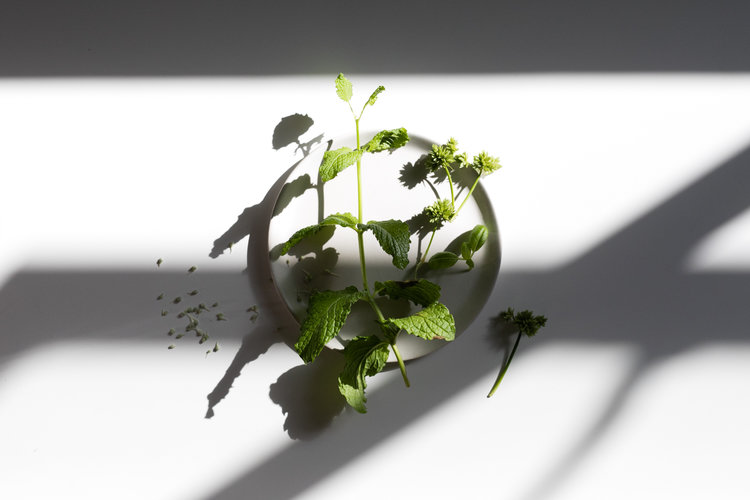Herbs & Supplements for Morning Sickness
Image: Glow Gathering
Morning sickness refers to nausea during pregnancy. It typically occurs during the first few months and, despite its name, can occur at any time of the day. The cause of morning sickness is unknown but researchers have often linked it with blood sugar imbalances. Maintaining a healthy lifestyle through a balanced diet, herbs, and supplements can go a long way in alleviating nauseating sensations. Though it’s important to be gentle with yourself at this time & do you best. Some days, this may mean it’s all out the window and you just need a bunch of empty carbs to soothe nausea. Do what you can, hydrate often, and try to get down a decent amount of healthy fats and protein each day.
Morning sickness does often occur in the morning and is usually due to dehydration or low blood sugar. Nausea in the morning can often be minimized by having a bedtime snack of protein and complex carbohydrates and drinking 2-3L of water throughout the day. Also try keeping water and a snack by your bedside to take immediately upon rising, before getting out of bed!
Be sure to check in with your holistic practitioner, herbalist or midwife, prior to taking or combing herbs & supplements.
Supplements
Multivitamin and mineral
A high quality prenatal multi supplement will help cover any gaps in your nutrient intake through food
Vitamin K-3 with Vitamin C
Vitamin K-3: 5mg (should be in multi)
Vitamin C: 250 - 750 mg divided into 2 or 3 doses a few hours apart
Vitamin B6
25 mg, 1-3 times a day (should be in multi)
P5P form (pyridoxal-5-phosphate)
Helps liver eliminate excess hormones
Do not continue to take while breastfeeding - may reduce milk
Magnesium
200 to 500 mg/day
Take in bisglycinate or citrate form for best absorption
Herbs
Ginger is well known for its action as a digestive aid. Its carminative, antiemetic and antispasmodic properties help to settle stomach upset, prevent vomiting and as a warming herb, it provides warm soothing comfort. Ginger also helps to reduce inflammation and relieve pain.
Tea and/or capsules
Capsules: 1 to 2 grams per day of encapsulated ginger
Divided into doses of 250 milligrams
Nettle leaf is a uterine tonic and an antiemetic, which helps to prevent nausea and vomiting. And as a bonus, nettle leaves are nourishing as they are loaded with vitamins and minerals, especially chlorophyll and iron, to help support a healthy pregnancy.
Best consumed as a Tea or infusion
Red Raspberry leaf is a nutritive herb that is a uterine tonic. Can calm morning sickness; often used to relieve PMS symptoms. *Caution - raspberry leaf is not recommended to be taken until the second or third trimester of pregnancy unless you’ve taken it before.
Tea; can be combined with nettle leaf
Wild Yam is a uterine tonic and antispasmodic. Helps to tone the uterine muscles and relieve cramps and spasms.
Tincture form
Use as indicated on the label
Other herbal teas that will provide a calming effect to consider: Lemon balm, dandelion leaf, chamomile, peppermint leaf
Everyday tools
Have a bedtime snack consisting of protein and complex carbohydrates
Eat every two hours - small regular meals rather than larger meals three times a day
Helps to balance blood sugar and reduce the chance of digestive upset
Reach for bland foods such as rice and broth
Consume high- fiber foods to ensure proper elimination of waste
Good sources of fiber include: chia seeds, flax seeds, leafy greens, and fresh fruits. As you Increase your fiber intake, increase your water intake as well. Otherwise, constipation may be an issue.
Have protein with every meal and snack
Good sources of protein include: animal meats (poultry, beef, lamb), fish, seafood, eggs, dairy, beans, peas, lentils, nuts, nut butter, seeds, tempeh, quinoa, amaranth, buckwheat, spirulina, hemp seeds, chia seeds
Stay hydrated; drink unsweetened liquids such as filtered water or herbal teas. To spruce up your filtered water add mint leaves, lemons, limes or basil.
Avoid fatty and greasy foods but be sure to consume healthy fats such as avocado, wild-caught fish (sardines, mackerel, salmon), coconut oil and nuts + seeds daily.
Always eat a healthy protein and fiber-filled breakfast. This will help to keep energy levels up and balance blood sugar. Eggs + avocado & green + gf toast is a great option!
Having morning sickness is a day-to-day problem to tackle, and everyone will approach it differently. Even incorporating one or two recommendations each day is better than doing nothing at all. It may take time to see improvements but simple steps will definitely help. Try to keep stress levels low during this time by doing what you can each day and being as gentle as possible with yourself and your changing body.

